Our website is made possible by displaying online advertisements to our visitors.
Please consider supporting us by disabling your ad blocker.
Premiership of Boris Johnson
 Official portrait, 2019 | |
| Premiership of Boris Johnson 24 July 2019 – 6 September 2022 | |
| Monarch | Elizabeth II |
|---|---|
| Cabinet | |
| Party | Conservative |
| Election | 2019 |
| Seat | 10 Downing Street |
|
| |
Boris Johnson's tenure as Prime Minister of the United Kingdom began on 24 July 2019 when he accepted an invitation of Queen Elizabeth II to form a government, succeeding Theresa May, and ended on 6 September 2022 upon his resignation. Johnson's premiership was dominated by Brexit, the COVID-19 pandemic, the Russian invasion of Ukraine, and the cost of living crisis. As prime minister, Johnson also served simultaneously as First Lord of the Treasury, Minister for the Civil Service, Minister for the Union, and Leader of the Conservative Party.
Johnson defeated Jeremy Hunt in the 2019 Conservative Party leadership election on 23 July 2019, and was appointed prime minister the following day. He re-opened Brexit negotiations with the European Union and in early September he prorogued Parliament; the Supreme Court later ruled the prorogation to have been unlawful. After agreeing to a revised Brexit withdrawal agreement but failing to win parliamentary support, Johnson called a snap general election to be held in December 2019, which the Conservative Party won. During Johnson's premiership, the government responded to the COVID-19 pandemic by introducing various emergency powers to mitigate its impact and approved a nationwide vaccination programme. He also responded to the Russian invasion of Ukraine by imposing sanctions on Russia and authorising foreign aid and weapons shipments to Ukraine.[1]
In the Partygate scandal it was found that numerous parties had been held at 10 Downing Street during national COVID-19 lockdowns, and COVID-19 social distancing laws were breached by 83 individuals, including Johnson, who in April 2022 was issued with a fixed penalty notice. The publishing of the Sue Gray report in May 2022 and a widespread sense of dissatisfaction led in June 2022 to a vote of confidence in his leadership amongst Conservative MPs, which he won. In July 2022, revelations over his appointment of Chris Pincher as deputy chief whip of the party while knowing of allegations of sexual misconduct against him led to a mass resignation of members of his government and to Johnson announcing his resignation as prime minister. Following the July–September 2022 Conservative Party leadership election, Johnson was succeeded as prime minister by Liz Truss, his foreign secretary.
Johnson is seen by many as a controversial figure in British politics.[2][3] His supporters have praised him for being humorous, witty, and entertaining,[4] with an appeal reaching beyond traditional Conservative Party voters, making him, in their view, an electoral asset to the party.[5][6] Conversely, his critics have accused him of lying, elitism, cronyism and bigotry.[7][8][9] As prime minister, his supporters praised him for "getting Brexit done", overseeing the UK's COVID-19 vaccination programme, which was amongst the fastest in the world, and being one of the first world leaders to offer humanitarian support to Ukraine following the Russian invasion of the country.[10][11][12] Within Ukraine, Johnson is praised by many as a supporter of anti-Russian sanctions and military aid for Ukraine.[13] His tenure also saw several controversies and scandals, and is viewed as the most scandalous premiership of modern times by historians and biographers alike.[14]
- ^ "UK Gives £1 Billion to Ukraine to Help Fund Offensive Operations". Bloomberg.com. 29 June 2022. Retrieved 7 July 2022.
- ^ Davies, Guy (23 July 2019). "Meet Boris Johnson: The UK's controversial new prime minister". ABC News. Archived from the original on 30 April 2021. Retrieved 8 May 2021.
- ^ Blitz, James (23 July 2019). "Why is Boris Johnson such a divisive figure?". Financial Times. Archived from the original on 24 July 2019. Retrieved 5 May 2021.
- ^ Gimson 2012, p. 20.
- ^ Kirkup, James (7 January 2015). "Boris Johnson goes looking for Conservative friends in the north". The Telegraph. London. Archived from the original on 10 January 2022. Retrieved 5 May 2021.
- ^ Purnell 2011, p. 327.
- ^ Edwards & Isaby 2008, p. 110.
- ^ Conn, David; Pegg, David; Evans, Rob; Garside, Juliette; Lawrence, Felicity (15 November 2020). "'Chumocracy': how Covid revealed the new shape of the Tory establishment". The Observer. Archived from the original on 15 November 2020. Retrieved 15 November 2020.
- ^ Purnell 2011, p. 365.
- ^ "'Get Brexit Done.' The Slogan That Won Britain's Election". Time. 13 December 2019. Archived from the original on 30 January 2020. Retrieved 15 May 2023.
- ^ Editorial (1 February 2021). "The Guardian view on the vaccine rollout: the state we're in". The Guardian. ISSN 0261-3077. Archived from the original on 15 May 2023. Retrieved 15 May 2023.
- ^ "Boris Johnson's support for Ukraine was special, President Zelensky says". BBC News. 7 July 2022. Archived from the original on 15 May 2023. Retrieved 15 May 2023.
- ^ Spencer, Richard (24 April 2022). "Ukrainians rename Odesa road as Boris Johnson Street". The Times. Archived from the original on 4 May 2022. Retrieved 2 May 2022.
- ^ "The most controversial PM since Lloyd George: historians on Boris Johnson". The Observer. 4 September 2022. Archived from the original on 4 September 2022. Retrieved 4 September 2022.
Previous Page Next Page




